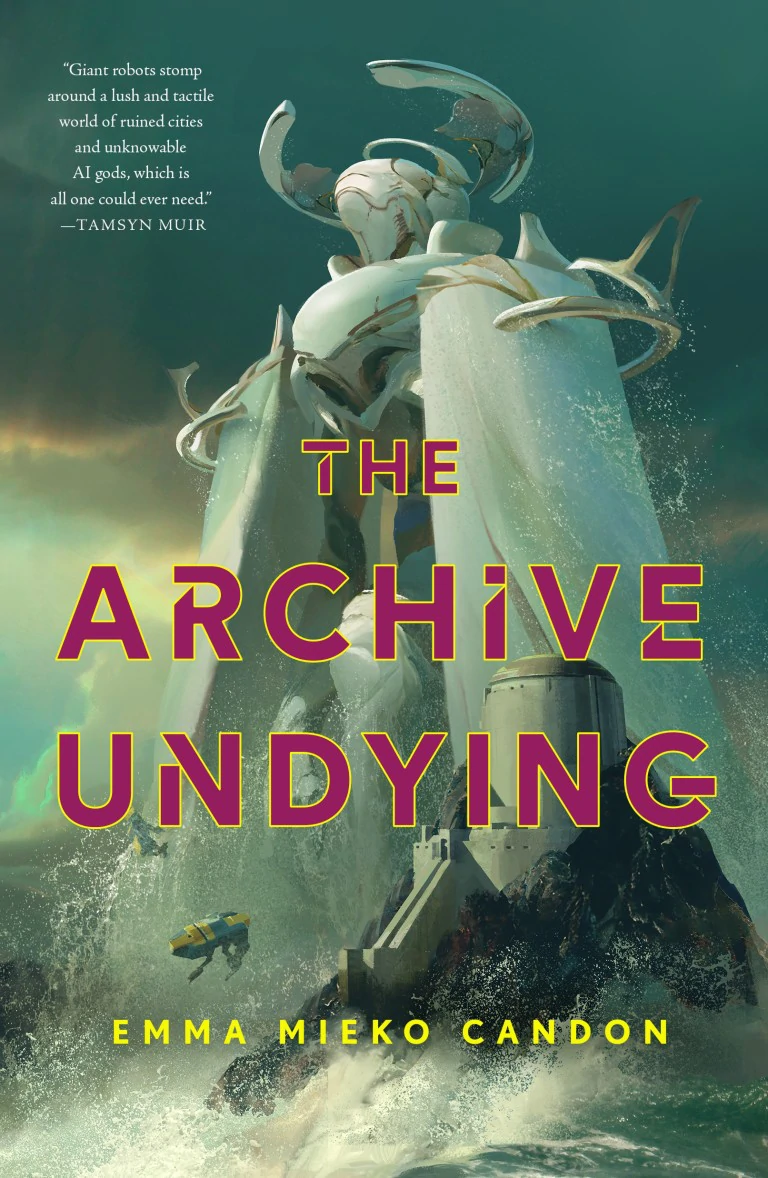
Review: The Archive Undying by Emma Mieko Candon
Words By Simon Kerr
Published June 27, 2023 by Tordotcom
Sunai—nomadic, immortal, horny—wakes up having taken a salvage job he doesn’t remember agreeing to. It has already taken him outside the city walls, in a rig escorted by an enormous, violent, and fabulously scarlet mech. Worse, the rig has no kitchen.
In this world, AI gods watch over their patron cities—until they don’t. Until they become corrupted and lose control, and the citizens under their protection in turn lose their safety or their lives. In Sunai’s case, he is the relic of one such AI, a deathless supplicant of a dead god who once delighted in the beauty of organic life. Sunai hides from the Harbor, an organization that seeks relics of corrupted AI to control the AIs’ husks, and more desperately hides from his own past.
The Archive Undying wastes no time entering the action, kindling the stakes, and challenging the main character. Author Emma Mieko Candon (she/they) begins this book with deft characterization, swiftly painting a lovably reckless lead, his latest inadvisable hookup, and a rather suspicious crew.
The greatest strength of this book is the writing, which is fluid, clever, and hilarious. Some descriptions read like poetry, others made me laugh out loud: “You were interfaced when corruption hit, riddled with finer threads, all white and tender, the dendritic web through which you understood Iterate Fractal meat to finally consume you. If Iterate Fractal means to eat you, it had better hurry its shit up.” Anyone can tell from the cover that the aesthetics of this world are peak: green mecha sci-fi, lush fauna overgrown on the ruins of malfunctioning robots. The worldbuilding is stunning, if slightly opaque at times. I can picture the cities, but not how they function; details about various factions were thrown out too fast with too little foundation.
The first half is almost a book in itself; the plot is tight with stakes that naturally evolve and progress and come to a thrilling head. I was riveted, grinning at the page and the witty characters and the fascinating mystery of what they found on their salvage mission, and just what would come of their meddling.
But in the second half, my clarity of the plot faltered more and more. The formerly vivid action became difficult to picture, and even more difficult to pinpoint its causes and consequences. The stakes and plot felt like a spinning top—incredibly fast, then wobbling, then falling. The characterization that made me tear through the first half evaporated, leaving me with a cast who behaved so out of character, I felt like I’d never met them.
Often, just as the plot swam too far ahead of me, I was delivered a concise explanation through a clever bit of dialogue to clue me into what had just happened, but the fact that I couldn’t follow along without these hints left me dizzy. Reveals hit, and I couldn’t piece together until pages later what the significance was. The characters stopped behaving in ways that made sense to me from their initial characterization. The point of view takes a drastic series of warps and wefts, draping shrouds over an already complex plot.
This novel spans so much action, changing character motives, and wild escalations in conflict. My initial read of the first half had me thinking that this ~500-page novel was as delightfully complicated as the first full three books in an SFF series while, incredibly, remaining digestible. This book dances, and it doesn’t miss a single step—but then it becomes a different book entirely. Nevertheless, the beautiful writing kept me reading with fascination, even as my understanding of the plot continued to slip.
This is a drunk chess game of a book. (Not writing from experience, why do you ask?) It’s complicated, progressively confusing—but still fun. I wish the book I began was the same book the entire way through. The worldbuilding is vivid and colossal, but it’s just not penetrable. The plot fascinates, if you can navigate through the points where the plot bewilders. It’s a book you’d want to take your time with. It may be a book I’ll return to in a year or two and discover the 30 percent of clarity I was missing and happily say, “It’s better than I remembered.” Despite its density, I don’t discourage readers from picking up The Archive Undying this summer. If you do take a chance on this book, hold on to your robot socks, and maybe take some notes to keep track of things. I dearly hope you take to it better than I did; the world Candon has built here deserves the patience of a second chance.